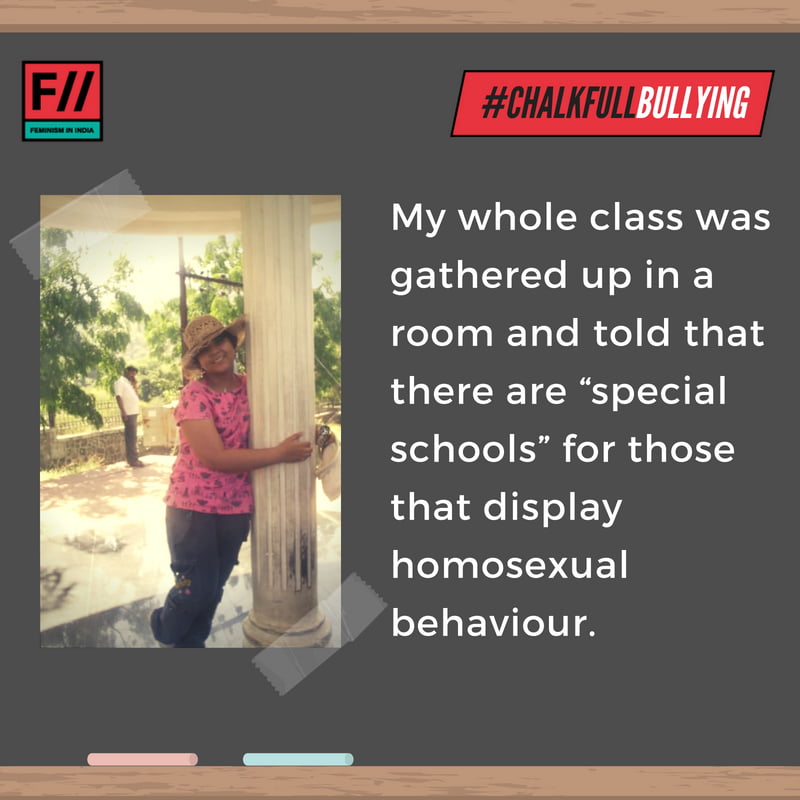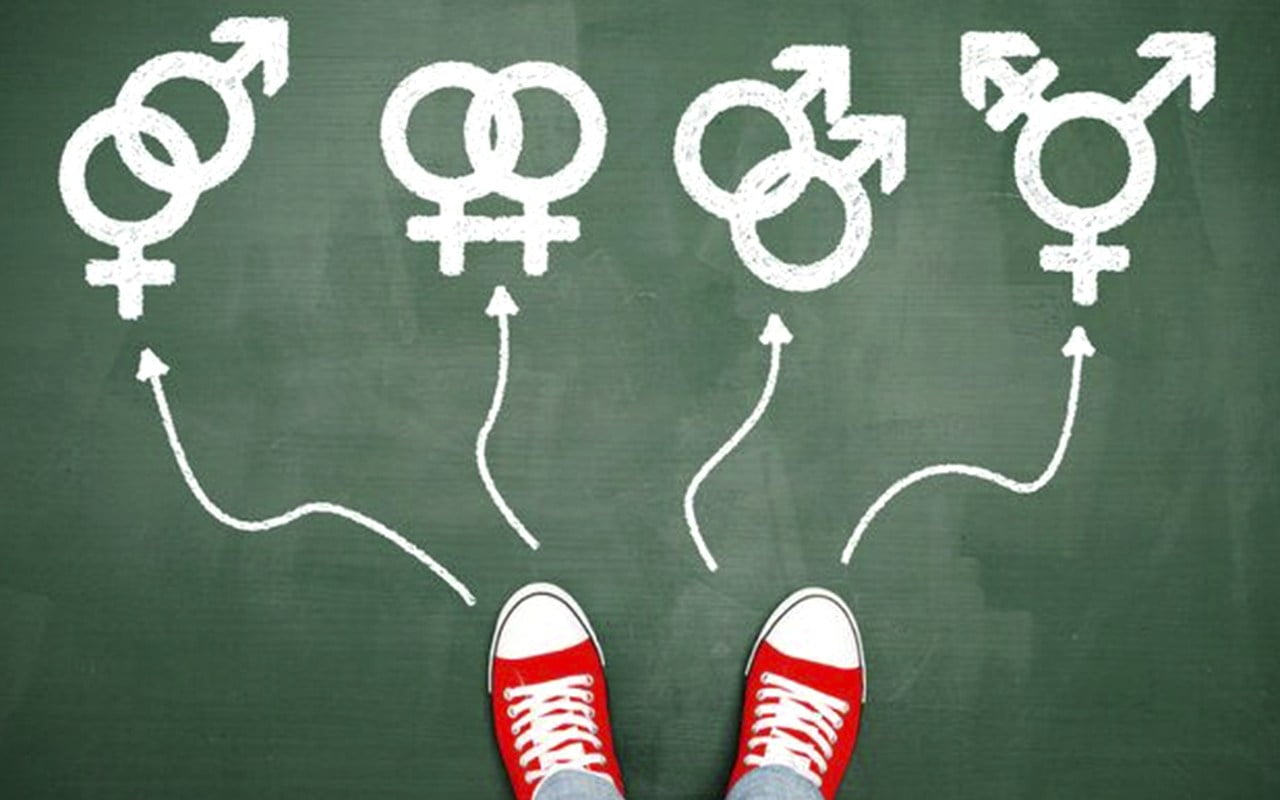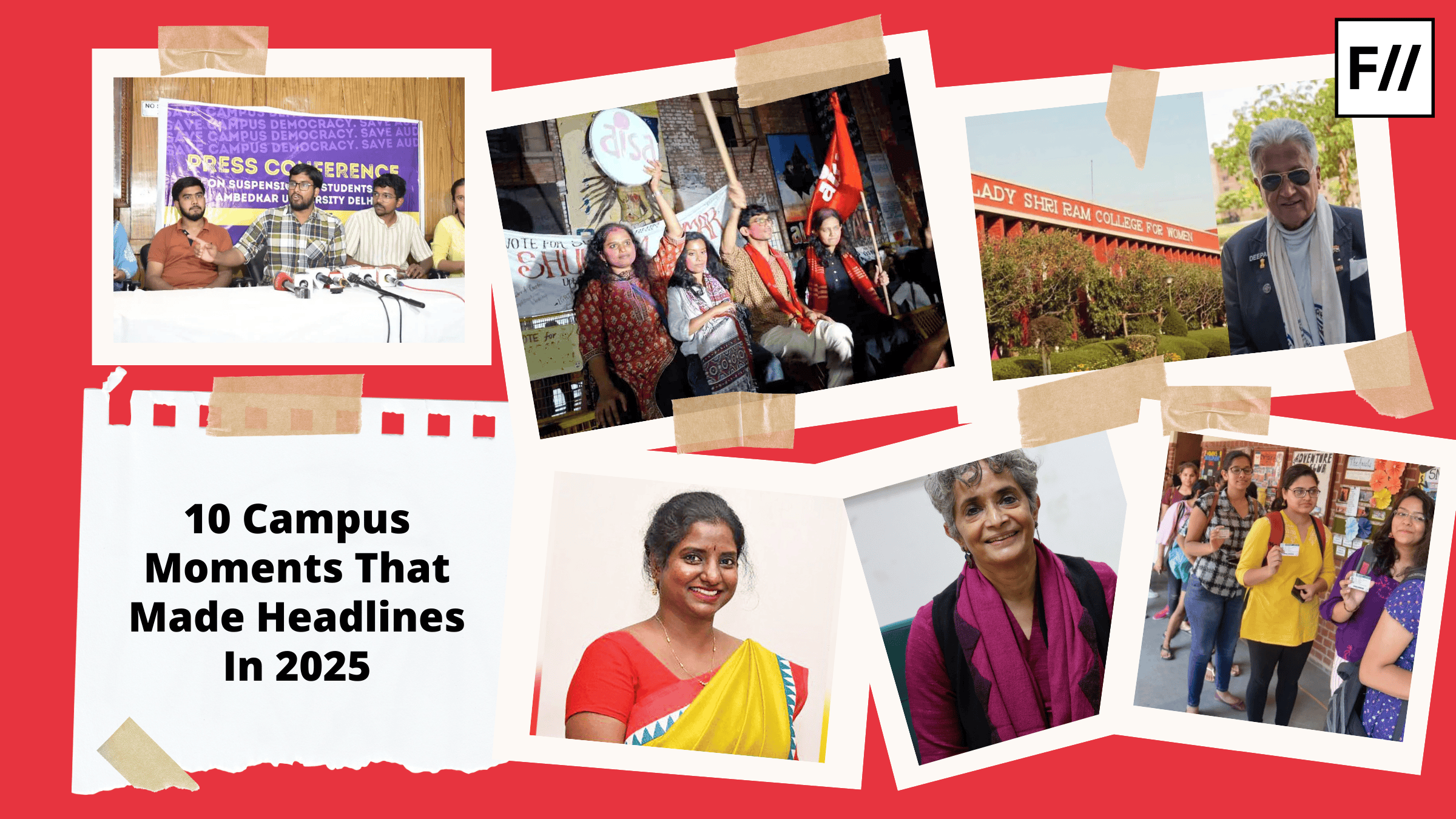Editor’s Note: #ChalkfullBullying is a campaign that resolves to tell stories about gender-based bullying that happens in school, where students, especially non-binary and girl students, are subject to harassment, moral policing, severe disciplining and punishment, and routine bullying. Their fault being: not conforming to outdated gender stereotypes, the repercussions for which can scar us for a lifetime.
Posted by Sneha Roychoudhury
What I remember most from school are straight lines. Every morning a whole compound of students, queued up in straight lines and singing hymns. Saying the Lord’s prayer, while we sat at desks, aligned into straight lines. Straight lines of women being systematically transformed into ‘ladies’ for decades while dissent is beaten out of their spirit.
Recently, my city took to social media to denounce the regressive act of a school forcing a couple of their students to come out of the closet. Homophobia became a central discussion on all digital platforms for a few days and I noticed a host of emotions being expressed in relation to the incident – a common one among them surprise.
Given the attention the incident received, I realised that all of us sat up to the reality of rampant discrimination based on sexual orientation that is prevalent in schools across the board in general and convent schools like the one I attended in particular.
I have known, over time, that a wide number of factors work in cahoots with each other to engineer a hostile atmosphere for gender and sexual orientation-based bullying and marginalisation in schools like mine. A very conservative and rigid understanding of morality is ruthlessly enforced through overt measures that were codified as rules and principles of discipline.

Along with this there is a more underlying, subtle creation of imagery around teachers who subvert the agency of students, with their consent through a “mother knows better” rhetoric that is systematically fed to us for 16 years of school, in order to make this process of creating unquestioning women, especially in gender-segregated schools, successful.
Questioning was disliked in my school. Having opinions and the confidence to voice them was discouraged. In school, I was labelled ‘bold’, ‘loud’, ‘unpleasant’ and the foremost sin of all – ‘un-ladylike’. Women who don’t sit with their legs together are precocious and the only way to remember that is to practice it in class, at breaks, while commuting to school – to remember it at all points until it becomes as much a part of you as the very skin you are meant to be so ashamed of.
As we grew up and our bodies changed, instead of addressing the questions of safety, of the male gaze, of how with our changing bodies our worlds would change forever, the school left no stone unturned to make us apologetic for our bodies. Our undergarments were brought under the scrutiny of authorities – straight lines of women being poked and prodded, dehumanised, being told that the clothes they wore were more important than their thoughts inside the classroom.
Agency wasn’t part of the vocabulary of my convent education. Words such as privacy, consent and personal space were sanitised and eventually diminished by ideas of school decorum, duty towards the institution and the rules in our school diaries. What was created was a stratification among students who were trying to make sense of their increasing anxieties as women growing up in a world fraught with discrimination.
Also Read: How I Was Traumatized At My Catholic Co-Ed School | #ChalkfullBullying
For most, taking comfort in the idea that the authorities were doing it for our best was important in order to survive in realities that repressed the expression of both gender identities and sexualities. As a result, our school became successful in creating class after class of students who believed in the problematic, sexist, homophobic ideas that these institutions peddled as morality. Mostly as a part of the curriculum that was called moral education class.
I was fifteen and in ninth grade when matters were made much worse. Sexual orientation, while never openly or healthily addressed, was always a large concern for the faculty as well as school authorities. In a rigorously enforced heteronormativity that is supplemented by notions of abstinence, teachers always seemed to be wary of students once they reached the ages of fourteen or fifteen.
The surveillance over our bodies and activities was stepped up and more aligned to notice if we were projecting ‘deviancy’. I was. I was fifteen, bisexual and very aware of my sexuality given my “rebellious” tendencies and the matter became a bone of contention with a school that made sure to not merely label my deviant behaviour but also harass me.
a rigid understanding of morality is ruthlessly enforced through measures codified as rules and discipline.
My parents were notified of my “incorrigible” behaviour and the threat my friendship with other students of the class posed. My whole class was gathered up in a room and told that there are “special schools” for those that display homosexual behaviour. We were also told that such behaviours are not our parents’ fault and could be corrected if detected, which was the whole purpose of such exercises.
This unpleasant conversation had been preceded by the massive invasions of our privacy such as bag checks, in which my journal was not merely discovered but also read, discussed by teachers and students and used against me as ammunition to systematically bully me. We all grew up pitted against each other, untrusting and vicious towards each other because the school created an environment where women policed each other to gain any ounce of leverage they could within this constant oppression.
Our education system stunts original thought, dissent and individuality. In the case of women that includes enforced patriarchal norms, gender roles, shaming and moral codes – only soft-spoken, well-behaved ladies are acceptable. Our school enforced these ideas, embedded in both our history of colonialism and nationalism, with a passion.
They put us in straight lines and labelled boxes and rapped us in the head when we tried to peer out, hoping that we would get habituated to the darkness of control. We weren’t prepared for the violence that the lives of women are in the world outside, we weren’t asked to be fierce, to understand our rights – and for all our years of indoctrination in the higher values of charity, we were not sensitised to the anxieties of our peers.
Also Read: Where’s The Prestige Now? St Anthony’s Students Speak Out | #ChalkfullBullying
Sneha is a student of history and has worked as a policy assistant to Members of Parliament for the past couple of years. She can be followed on Twitter, Instagram and Medium.
About the author(s)
Guest Writers are writers who occasionally write on FII.




